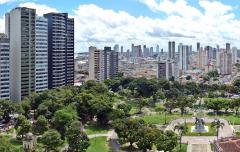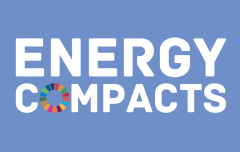SEforALL presence at The 8th Global Off-Grid Solar Forum and Expo 2024
The Global Off-Grid Solar Forum and Expo 2024 features powerful discussions, showcases disruptive technologies, and creates spaces to unlock new and innovative partnerships that will help drive universal electricity access, build climate resilience, and power agriculture, enterprise, health and more.
Led by SEforALL's CEO Damilola Ogunbiyi, our team will be participating in several key sessions at the GOGLA Forum, sharing their expertise and advancing partnerships. The Forum is an opportunity for us to build momentum for Mission 300, the transformative new initiative led by the World Bank and AfDB, to bring electricity to 300 million people in Sub-Saharan Africa by 2030.
Humanitarian Energy Conference
7 October 2024
Mövenpick Hotel & Residences Nairobi
Session | Time |
|---|---|
Health & humanitarian | 13:45 – 15:00 EAT |
Energy mainstreaming | 15:30 – 16:45 EAT |
8th Global Off-Grid Solar Forum and Expo 2024
8-10 October
Kenyatta International Conference Centre, Nairobi
Tuesday 8 October | ||
|---|---|---|
Session | Time | Room |
Sustainable Electrification of Health Institutions and Schools (Invite – only) | 8:30 – 11:00 EAT | Impala |
Plenary Session | 9:15-12:15 EAT | Tsavo B & C |
M300 roundtable Financing Off-Grid Energy Access Solutions Closed-door | 13:30-14:45 EAT | Board Room |
Success Stories: governments achieving impact through holistic policies and programmes | 13:30-14:45 EAT | Tsavo B |
M300 roundtable Procurement for Off-Grid Energy Closed-door | 15:45-17:00 EAT | Board Room |
Empowering Public Institutions: Lessons on Sustainable, Long-Term Electrification Strategies | 15:45-17:00 EAT | Tsavo B |
Empowering Energy: Gender Transformative Solutions for a Just Energy Transition | 15:45 – 17:00 EAT | Aberdares |
Wednesday 9 October | ||
|---|---|---|
Session | Time | Room |
Empowering vulnerable communities: Increasing resilience and adaptation finance for off-grid solar solutions | 8:30- 9:45 EAT | Tsavo C |
M300 roundtable Reforming Technical Assistance Closed-door | 8:30 – 9:45 EAT | Board Room |
M300 roundtable Role of Public Sector Closed-door | 10:45 – 12:00 EAT | Board Room |
Private Sector Approaches for Sustainable Energy & Digital Connectivity in Health Facilities & Schools | 13:30 – 14:45 EAT | Turkana |
M300 roundtable Productive use Closed-door | 13:30 – 14:45 EAT | Board Room |
Thursday 10 October | ||
|---|---|---|
Session | Time | Room |
Financing Rural Electrification as Essential Infrastructure Projects | 8:30 – 9:45 EAT | Tsavo B |
Sustainable Electrification of Health Institutions and Schools – A Public Sector Perspective | 8:30 – 11:00 EAT | Shimbala Hills Room |
Cooling to Improve Lives and Livelihoods | 10:45 -12:00 EAT | Lenana Room |
Rural Electrification: Innovations and tools for sustainable least-cost electrification solutions | 10:45 – 12:00 EAT | Tsavo C |


